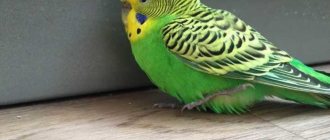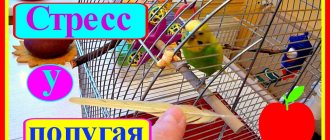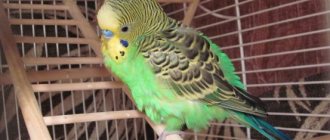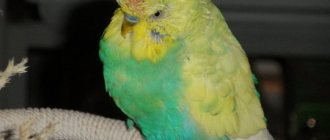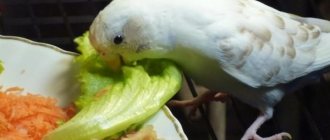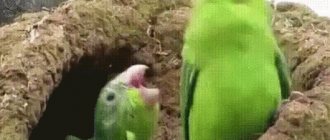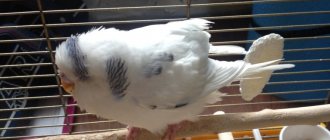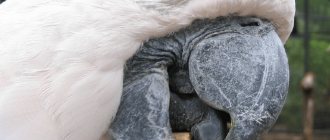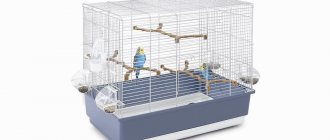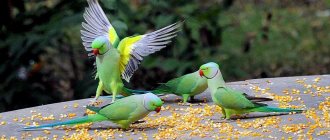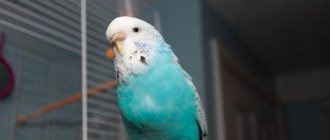Avitaminosis
The parrot is shaking due to a lack of vitamins. You should consult your veterinarian about this. Perhaps changing the food to one enriched with microelements will help. After consultation, a vitamin supplement is chosen for the main diet. Feeding with fresh vegetables and fruits cannot be ignored. Almost everything suits parrots except papaya, persimmons and nuts. It is also necessary to offer the bird greens:
- sorrel;
- dandelions;
- wheatgrass;
- shepherd's bag
The main thing is to find out in time why the parrot begins to shake.
The parrot is shaking
Many parrot owners are often concerned with the question, why is their pet trembling? Chills can be caused by hypothermia and excitement, as well as by more serious causes, stress and infectious diseases.
Parrots have a highly developed nervous system and they react very vividly to any changes in the environment. The behavior of a newly purchased pet placed in an unfamiliar environment will indicate how easily it adapts to change. If your parrot's tail is shaking or its wing is trembling, it may take some effort to get it comfortable in its new habitat.
It may take about two weeks for your parrot to adapt.
During this period, try not to annoy your pet; too intrusive attention can stress him out.
Some useful tips:
- Place the cage at eye level. If you look at your parrot from above, it will feel depressed.
- The cage must always have fresh water and high-quality fortified food.
- Do not allow children to make noise and scream near the cage or pester the parrot.
- Keep other pets away from the cage as they may frighten the bird.
- Accustom your pet to you gradually. Cover yourself with a blanket along with the cage, try to take the parrot in your hands and talk to him affectionately.
If the bird's condition does not improve after 2 weeks, try to identify possible other reasons why the parrot is trembling.
Stress
A budgie may shake or tremble due to fright or severe stress. Wavys are very shy and emotional creatures, so they have a hard time withstanding any changes. The bird may be frightened by sudden noise, loud sounds, music, or guests. Changing the usual environment or replacing a cage can also cause severe stress in the bird.
It also happens that the wavy can be frightened by other pets living in the apartment (cats, dogs, other birds, rodents). This can happen not only when the bird is on a walk, but also when it sits in its cage. Therefore, try to protect your pet, especially during the adaptation period, from contact with other animals that can greatly frighten him.
Parrot and cat
Once in the house of a new owner, until the wavy gets used to its new habitat and members of its family, it may become nervous, behave restlessly, constantly scream, and fluff itself up. To ensure that the adaptation period passes as quickly and stress-free as possible, try not to disturb your pet at first. It will take some time for the parrot to get comfortable and get used to the new environment.
Goiter inflammation
This is a disease of granivorous birds, often occurring with vague symptoms. The main symptom is inflammation of the goiter sac. In addition, the bird:
- shakes and stretches his neck;
- behaves restlessly;
- constantly regurgitates food;
- becomes lethargic;
- refuses food.
In advanced cases, the parrot spits out food, the mucous membranes become bluish, and the crop sags. The pet cannot swallow at all, its beak often opens, viscous saliva appears, and the feathers on its head stick together. The bird subsequently dies. This condition leads to:
- poor quality food;
- poisoning from toxic plants or chemical vapors;
- complication after infectious diseases.
It happens that a bird does not receive the necessary mineral elements and compensates for them by stuffing its crop with grain, which leads to inflammation.
The disease is often detected at a stage when it is practically impossible to help the pet. As a rule, treatment at home cannot save the bird; an urgent visit to the veterinarian is necessary. It is important not to miss the symptoms and find out why your pet parrot's head begins to shake.
For this purpose, an examination is carried out. Antibiotics are used only if the infectious origin of the disease is confirmed. In parallel with the main treatment, medications are given to support the liver. To avoid exhaustion, the bird is fed liquid porridge.
Signs indicating that the parrot is unwell
Any illness that can happen to your domesticated pet always begins with the appearance of certain signs of the disease. Timely detection of these signs can not only save your bird’s life, but also significantly facilitate the process of its treatment.
Among the most common signs of an incipient pet illness are loss of appetite, self-plucking, causeless restlessness, lethargy, drowsiness, upset stomach, breathing problems, etc.
Any of the listed and not mentioned in the article deviations in the behavior of a domesticated parrot should instantly attract your attention. And if you consider it necessary, then you should immediately visit the veterinarian.
Diseases of the budgerigar accompanied by trembling
Frequent diseases that are accompanied by trembling are:
- A symptom of poisoning is trembling. Digestive disorder.
- Cold.
- Infectious diseases.
- Diseases of internal organs.
- Poisoning.
- Parasitic diseases.
In addition to trembling, the pet experiences weakness, difficulty breathing, and its eyes are usually closed. Since the parrot quickly loses strength, it sits at the bottom of the cage. Self-diagnosis and treatment are not advisable; immediate consultation with a doctor is recommended.
Symptoms of self-plucking
In large birds, self-plucking syndrome occurs more often than in small birds, and there is no clear explanation for this. Budgerigars also itch and bite themselves. Calmly scratching the body with beak and claws is a way to get rid of itching.
Symptoms that accompany most parrot ailments:
- the pet develops apathy and loses interest in current events;
- while awake, the bird constantly itches with varying intensity;
- inside the cage and near it there are plucked feathers, broken and deformed;
- droppings contain feather particles;
- the bird plucks those parts of the body where it can reach;
- Bald patches appear on the stomach and chest;
- In some places the damage is so severe that bleeding wounds form.
Young, growing feathers are also plucked, but this is a painful process. However, even through the pain, the parrot continues to pluck out the “stumps,” damaging the follicles. This behavior cannot be ignored - it is necessary to identify the causes and correct the emotional state of the pet.
Why is he shaking his head?
Your pet may shake their head for many reasons:
- Looking for someone.
- Be sick.
- Particles of grains remained in the crop.
- Presence of a tracheal mite.
To exclude these diseases, it is necessary to conduct a visual inspection for damage and palpate the bird’s body: wings, legs, torso. A healthy individual shakes its head for reasons of anxiety, fear or curiosity. The inflammatory process may be accompanied by nausea and diarrhea.
The grains are stuck in the crop
Cockatiels and budgies should not be fed large, unmilled grains. If swallowed, the bird may not completely separate them, which will cause pain in the crop. The stuck piece can be felt with light movements. Ignoring the symptom leads to the death of the pet. Trembling in the body is sometimes accompanied by food coming out of the beak, which can occur in case of overeating.
Presence of a tracheal mite
The tracheal mite is a parasite that lives in the upper respiratory tract of birds and feeds on the contents of the secretion, affecting the respiratory system: trachea, larynx. As the mite grows, it limits access to oxygen. When trying to breathe, the cockatiel begins to shake its head from side to side.
It is necessary to take a smear for parasites and analyze the droppings. After receiving the result, the doctor prescribes antiparasitic drugs if necessary. The treatment process lasts 2 weeks. The first symptoms of the onset of the disease are wheezing, coughing and slight loss of voice. The symptom of trembling can also cause other parasitic diseases that appear against the background of vitamin deficiency.
If your pet continues to tremble for 24 hours, you should take your cockatiel to the veterinarian.
Nausea
Nausea and tremors in birds appear due to poor nutrition, failure to observe meal times, the presence of difficult-to-digest food components, scarcity of vitamins in the feed, and monotony of the diet. If the symptom is not cured in time, then gradually the movements become slow, the bird is passive, apathetic to everything, the pet often shakes its head, trying to get rid of the unpleasant symptom on its own.
Nausea can be the cause of poisoning, symptoms of parasitic diseases, skull trauma, and pathological processes of the digestive system. In such cases, the cockatiel needs care and a special treatment method.
Tumor of the swallowing organs
The tumor is a rare disease of birds, which during the growth process blocks access to air. During life, malignant cancer releases toxic substances into the blood, and during decay, toxic compounds that cause inflammatory processes, increased body temperature, which results in chills. Small tumor-like growths interfere with the development of vocal melody, and the individual begins to shake its head.
The process manifests itself in the form of symptoms: body trembling, difficulty swallowing, tickling.
A tumor of the respiratory organs is caused by inflammatory processes. In this case, it is necessary to apply dry heat to the sore spot and give the bird only warm water to drink. If the procedures are performed frequently, the swelling will be relieved quickly. Impaired swallowing is a dangerous symptom; if it is not eliminated, the pet will die from suffocation.
Injury
If the parrot has suffered a spinal injury, where the nervous system is involved, the initial symptoms will appear in the form of head twitching. If the parrot experiences pain, then it is necessary to find out where the damage occurred.
Diseases that cause seizures in parrots
How does a convulsive state manifest?
Main symptoms:
- Twitching of limbs.
- The parrot starts hitting the cage.
- Diarrhea.
- Lack of appetite.
- Loss of movement coordination. The bird will not be able to sit on the perch and will fall.
- The bird makes sounds that are uncharacteristic for it.
- Constant rotation of the head in one direction.
- Complete loss of control over your body during an attack.
- Constriction of the pupil.
- In severe cases, a coma develops - the bird falls and can lie for a long time without any signs of life, spreading its wings and paws.
Diagnostic problems
The problem is that even experienced specialists cannot immediately make the correct diagnosis based on one seizure in a parrot. As a rule, antibiotics, vitamins, and minerals are prescribed.
To avoid wasting time, you need to be attentive to your pet. Suddenly you missed something important that is not typical for the behavior of your bird. And when making the correct diagnosis and prescribing adequate treatment, this will be a decisive moment. Observe how often your bird has seizures, how long they last, or if they don’t stop at all. Maybe there are certain situations when a bird goes into a convulsive state?
Prevention
To eliminate unpleasant symptoms from your pet’s life, it is necessary to create acceptable feeding and maintenance conditions:
- Include fruits and vegetables in your diet. Feed regularly with food fortified with vitamins. Food and drink must be freely available. Check expiration dates on food regularly. Do not allow moldy products to be consumed.
- Artificially adjust daylight hours, giving the opportunity to fully rest.
- Avoid hypothermia and overheating.
- Do not create conditions for stress.
- Do not leave poisonous indoor plants, medications and small objects in the public domain.
If you follow the rules of care and take proper care, a budgie can live up to 15 years. A truly careful owner can extend its lifespan to 18 years. After all, only careful treatment of your pet keeps it active for a long time.
Contaminated air
Parrots have a special respiratory system, which includes several air sacs. During flight, these bags control body temperature, prevent overheating, and also enrich all internal systems and organs with oxygen several times better than in mammals.
This breathing system is very sensitive to various impurities in the air. Toxic particles and strong odors can be fatal, so it is necessary to ensure that perfumes, household aerosols, tobacco smoke, and air fresheners are not sprayed near the cage. During renovations in an apartment using varnishes and paints, glue, and other substances with a strong odor, the parrot should be left with relatives or friends. Toxin poisoning is difficult to treat, as it has a detrimental effect on the central nervous system and respiratory organs.
What to do if your parrot is shaking
- Stress . A budgie may tremble if it is nervous or afraid. Excitement may be due to a move or a change of owner. At first, it is necessary to disturb the bird as little as possible. Adaptation usually takes about a week. During this time, the parrot will get used to the new place and get used to the voice and presence of the new owner.
- Stressful situations often arise due to the presence of other pets. To ensure that your budgerigar does not experience fear and feels safe, it is necessary to limit access to the cage to other animals. It is always worth remembering that stress significantly reduces life expectancy.
- Also, the parrot's anxiety can be caused by the presence of children in the room where the parrot's cage is located. If the owner notices that the parrot is trembling, it is necessary to leave it alone. Over time, he will get used to the environment and new sounds and will stop being afraid.
- If your parrot is shivering due to hypothermia , you need to warm it up as soon as possible. You can place a special lamp next to the cage and point it towards the cage. The distance between the lamp and the cage should not be less than half a meter. The cage must be covered with fabric on two or three sides.
- A budgie may also suffer from overheating . The cage should not be placed next to heating devices, under an air conditioner, and the cage should not be exposed to direct sunlight. The optimal temperature for keeping budgies is 22-25 degrees.
- Often the reason that a parrot is trembling is due to improper or poor nutrition. A lack of vitamins in the body leads to the body weakening and being susceptible to disease. In addition to the grain mixture, the diet of a budgie should include vegetables and fruits, berries, herbs, tree branches, cereals, and mineral supplements. If your parrot refuses any food, you can purchase liquid vitamins that can be added to the water.
- of illness are noticed (vomiting, heavy breathing, discharge, unkempt appearance), you should urgently consult a specialist. He will order tests, determine the disease and severity.
- For various injuries and damage, the parrot should be carefully placed in a carrier and shown to a specialist.
If your budgerigar has been trembling for a long time, and the reason cannot be found out, you should seek help from a breeder or an ornithologist. The parrot should not be allowed to remain in this state for a long time. It is important to find out the cause of this behavior as early as possible and eliminate it.
Main reasons
Normally, a parrot should not tremble. The appearance of this symptom indicates a violation of the living conditions or disease of the bird. The reasons that the parrot is trembling and clucking may be:
- hypothermia;
- stress;
- avitaminosis;
- infections, parasitic infestations, injuries and other diseases;
- improper feeding;
- loneliness, boredom.
In any case, the owner must immediately take measures to eliminate the adverse factors that caused the trembling, and, if necessary, consult a veterinarian and begin treatment of the bird. Delay can lead to irreversible health problems, and in severe cases, the death of the pet.
Hypothermia
Budgerigars are heat-loving birds; they do not tolerate cold and drafts well. A frozen parrot trembles, closes its eyes, hides its head under its wing or puts its beak in the feathers on its back, shrinks, sits on its perch with a ruffled figure, and moves little. If such signs are detected, it is necessary to eliminate the draft as soon as possible and move the cage with the bird to a warmer place. For a while, you can place the cage near a central heating radiator or turn on an incandescent lamp above it. At the same time, part of the cage is curtained with fabric so that the air heats up faster.
Stress
One of the most common causes of trembling is stress. Stress in a parrot can be caused by:
- noise and loud sounds;
- strangers;
- pets, especially cats;
- change of owner;
- changing of the living place;
- moving another bird into the cage.
When stressed, a parrot shakes, trembles its wings, rushes around the cage, or, conversely, freezes in one place. If these signs are detected, it is necessary to create a calm environment around the cage, isolate the bird from other animals, and eliminate sources of loud sounds. After the parrot calms down, the trembling will stop.
Disease
The parrot may tremble due to increased body temperature or intoxication of the body due to various diseases. A sick parrot sits with its eyes closed and trembles, ruffles its feathers, moves reluctantly, eats little, and refuses to fly. Other symptoms of the disease may be: difficulty breathing, wheezing, sneezing, discharge from the eyes and nasal openings, vomiting, diarrhea, changes in the condition of the feathers (feathers falling out or sticking together), poor coordination of movements, lameness. In this case, it is necessary to show the bird to a veterinarian as soon as possible, who will make an accurate diagnosis and prescribe treatment.
Avitaminosis
A lack of vitamins in a bird's diet has a negative impact on its health. First of all, the nervous system suffers. If its functioning is disrupted, the parrot experiences trembling of its legs, wings, tail and entire body. Other signs of vitamin deficiency are lethargy, weakness, deterioration of the skin and mucous membranes, indigestion and coordination of movements, and reproductive dysfunction. Feathers become ruffled, dull, break off and fall out. To eliminate vitamin deficiency, it is necessary to adjust the bird’s diet. It should contain fresh fruits, vegetables and herbs, as well as vitamin and mineral supplements.
Why do the tail and wings tremble?
Most often, budgerigars' tail and wings tremble due to severe fright or stress. Trembling can be noticed in a newly acquired bird that is not yet accustomed to its new home and new owner. In this case, it is necessary to give the pet time to adapt to the changed conditions, do not pick it up, do not make sudden movements and do not raise your voice near the cage. The cage must be isolated from other animals and people who may frighten the parrot. After adaptation, the pet can be introduced to the rest of the family.
A bird that has lived in the house for a long time may shake its tail and wings from loneliness and boredom. In this case, it is necessary to pay more attention to the pet, play and communicate with it, let it go for walks around the apartment, and periodically offer new toys. If the parrot remains alone for a long time, you can add another bird to its cage.
If your parrot's wings are trembling and its tail is shaking, this may indicate that the bird is sick. Such symptoms are often observed with respiratory diseases and problems with the digestive system. Trembling occurs with brain injuries and diseases. Birds may also tremble from hunger and weakness if there is insufficient or monotonous feeding.
Why is he shaking his head?
Head trembling is a dangerous symptom that may indicate serious health problems in the bird. It usually accompanies diseases of the respiratory, digestive and nervous systems.
Parrots often shake their heads when the crop is full of grain, large pieces of food and foreign objects get into it. At the same time, the bird tries to free itself from the food masses; it experiences nausea and vomiting. The parrot becomes lethargic, closes its eyes, often nods its head, opens and closes its beak.
Another cause of head tremors is damage to the respiratory tract by tracheal mites. When this parasite infests birds, they experience difficulty breathing, wheezing, coughing, and partial loss of voice. The budgie shakes when trying to breathe or swallow food.
In inflammatory diseases of the pharynx, larynx or goiter, the mucous membrane of these organs swells, which makes breathing and food consumption difficult. At the same time, the parrot shakes, stretches its neck, worries, and spits out food.
Head tremors may result from brain damage due to injury or poisoning. In addition, birds shake their heads if they have tumors in the head and neck area.
